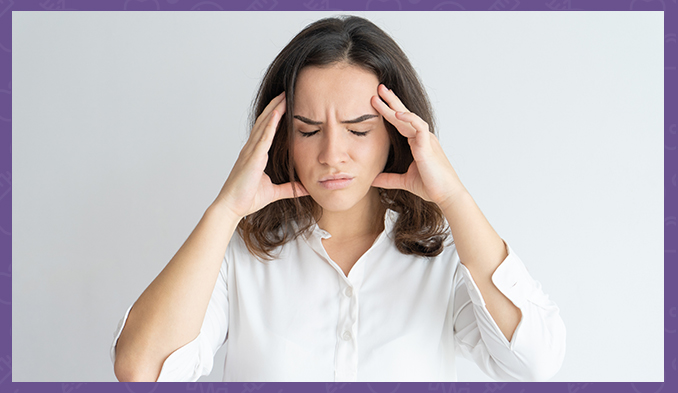Do we often suffer from headaches? Do we know what is a signal that we should consult a doctor?
If you find yourself in any of the following lines, you probably need the opinion of a specialist.
When we feel that we have a headache, it is often perceived as a complaint of a general nature. But is it really? What could be behind frequent headaches and should we be worried about our health.
While some types of headaches can be painful and debilitating, the majority of headache types can be treated with familiar painkillers and disappear within a few hours. However, it's important to know that frequent recurring "attacks" or certain types of headaches can also be a sign of something more serious!
The International Classification of Headache Disorders - ICHD, defines over 150 different types of headaches, but in general they all fall into 2 main categories: primary and secondary.
PRIMARY HEADACHE
The primary headache is not caused by another condition - it is a condition in itself. The main examples to this type are Migraine and Tension Headache.
Migraine
The person who has a migraine will characteristically feel a strong throbbing pain only on one side of the head. The person may experience increased sensitivity to light, sound and smell. Nausea and vomiting are also common.
About 1/3 of people experience specific disorders just before the onset of a seizure. These are visual and sensory disturbances that can last from 5 to 60 minutes.
These may include:
- Flickering lights or spots
- Spotting zigzag lines
- Rigidity
- Muscle weakness
- Difficult speech
Migraine is a condition that is characterized by recurrence and each attack can last up to 3 days. For many, this condition is lifelong. This type of headache is more commonly seen in people with certain established conditions such as depression, epilepsy.
Migraine attacks, in addition to medication, can be relieved by:
- Rest in a dark and quiet place
- Placing ice or a cold cloth on the forehead
- Intake of water
People who suffer from chronic migraines are well advised to consult a doctor for prescribing preventive treatment.
A doctor diagnoses a patient with chronic Migraine if the patient has experienced headaches:
- For more than 15 days per month
- For a period longer than 3 months
In addition to medication, other methods of dealing with the unpleasant condition are: meditation, acupuncture, neuromodulation therapy, which involves the application of mild electrical impulses to the nerves.
Tension headache
This is the most common headache. It is expressed as a dull, constant pain that is felt on both sides of the head. Some of the symptoms may include - a feeling of pressure behind the eyes, sensitivity to lights and sounds, tension on the face, head, neck and shoulders.
These headaches usually last from 30 minutes to several hours. The degree of severity may vary, but they rarely interfere with normal activities.
The cause of tension headaches is unclear, but stress, anxiety and depression are the most common sources.
Other factors that would trigger this type of headache include:
- Lack of movement
- Insufficient sleep
- Skip storage
- Dehydration
- Noise
- Eye congestion, etc.
Lifestyle changes and certain treatment methodologies can help prevent it. This includes skills to cope with stress, anxiety or depression, such as acupuncture, regular exercise, improving standing and sitting positions and much more.
Cluster headache
Cluster headache is a severe and recurrent headache that is six times more likely to develop in men than in women. People suffering from it describe intense burning or stabbing pain behind or around one eye.
Other symptoms may include:
- floating (watery) eye
- swollen eyelid
- nasal congestion or runny nose
- sensitivity to light and sound
- anxiety or agitation
Cluster headache is usually sudden, without warning and lasts between 15 minutes and 3 hours. People can experience up to eight attacks a day.
They are quite likely to be observed as daily clusters that can last for weeks or months. They usually occur at the same time of day, but also during sleep.
Any person experiencing these symptoms, which can sometimes be mistaken for hay fever, should consult their doctor.
The cause of cluster headaches is unclear, but they are more likely to occur in smokers. These people should avoid alcohol during attack periods. Treatment aims to reduce the severity and frequency of attacks. This could happen through medication treatment prescribed by a specialist. In the most severe cases, surgical intervention may be necessary.
Headache on physical exertion
Exercise headaches are caused by strenuous exercise. These headaches are usually very short-lived, although there have been cases described that last up to 2 days.
Hypnic headache
It is also known as "alarm clock" headache as it wakes people up at night.
Hypnic headache is a rare condition that usually doesn't first start in humans until around and over the age of 50, but it can start earlier. Hypnic headache consists of mild to moderate throbbing pain that is usually felt on both sides of the head. It can last up to 3 hours, and some of the other symptoms can be nausea and sensitivity to light and sound. People may experience several attacks each week. The cause of a hypnagogic headache is not clear and there are no known guesses.
For more information, we at Medical Karaj are at your service.
Call us on the following numbers "Medical Karaj": 0879 977 401 or 0879 977 402.
Also keep an eye on our constantly updated Facebook content.



